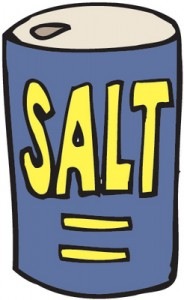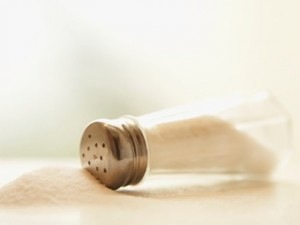 The short answer: no – even though sea salt might be marketed as a health food.
The short answer: no – even though sea salt might be marketed as a health food.
Sodium chloride is the chemical name for salt. Even though the words “salt” and “sodium” aren’t exactly the same they are often used interchangeably. You might find the word “sodium” on the Nutrition Facts Panel on the back or side of a package but yet see a phrase like “low salt” used on the front of the package.
Chemically, table salt and sea salt are not much different although they might taste different or have different textures. Sea salt and table salt, by weight, have the same amount of sodium. They both can have an effect on your blood pressure.
Sea water is evaporated to make sea salt. There is little processing and the water source, along with the trace minerals and elements left behind after evaporation, add flavor and color. Sea salt comes in different degrees of coarseness and types of grain or flake.
Table salt, mined from underground salt deposits, goes through processing to eliminate minerals. It usually has an additive to prevent clumping and may have added iodine, which sea salt doesn’t have.
When you read the labels on sea salt and table salt, they can lead to a bit of confusion. Because sea salt crystals are larger than table salt crystals less sea salt will fit on a teaspoon so the sea salt may seem to have less sodium. However, by weight it does not. But, by teaspoon, table salt has 590 mg of sodium in a teaspoon which weighs in at 1.5 grams. Sea salt has 400 mg in a teaspoon but that teaspoon of sea salt weighs in at 1 gram.
Should You Limit The Amount Of Salt You Eat?
The recommendation for daily sodium intake is a maximum of 2300 mg and not more than 1500 mg a day for people 51 or older, if you’re African American, or if you have diabetes, chronic kidney disease, or high blood pressure. Don’t be fooled by the salt shaker. Adding salt to food is certainly a source of dietary sodium, but processed and prepared foods account for the greatest amount of sodium in American diets.
